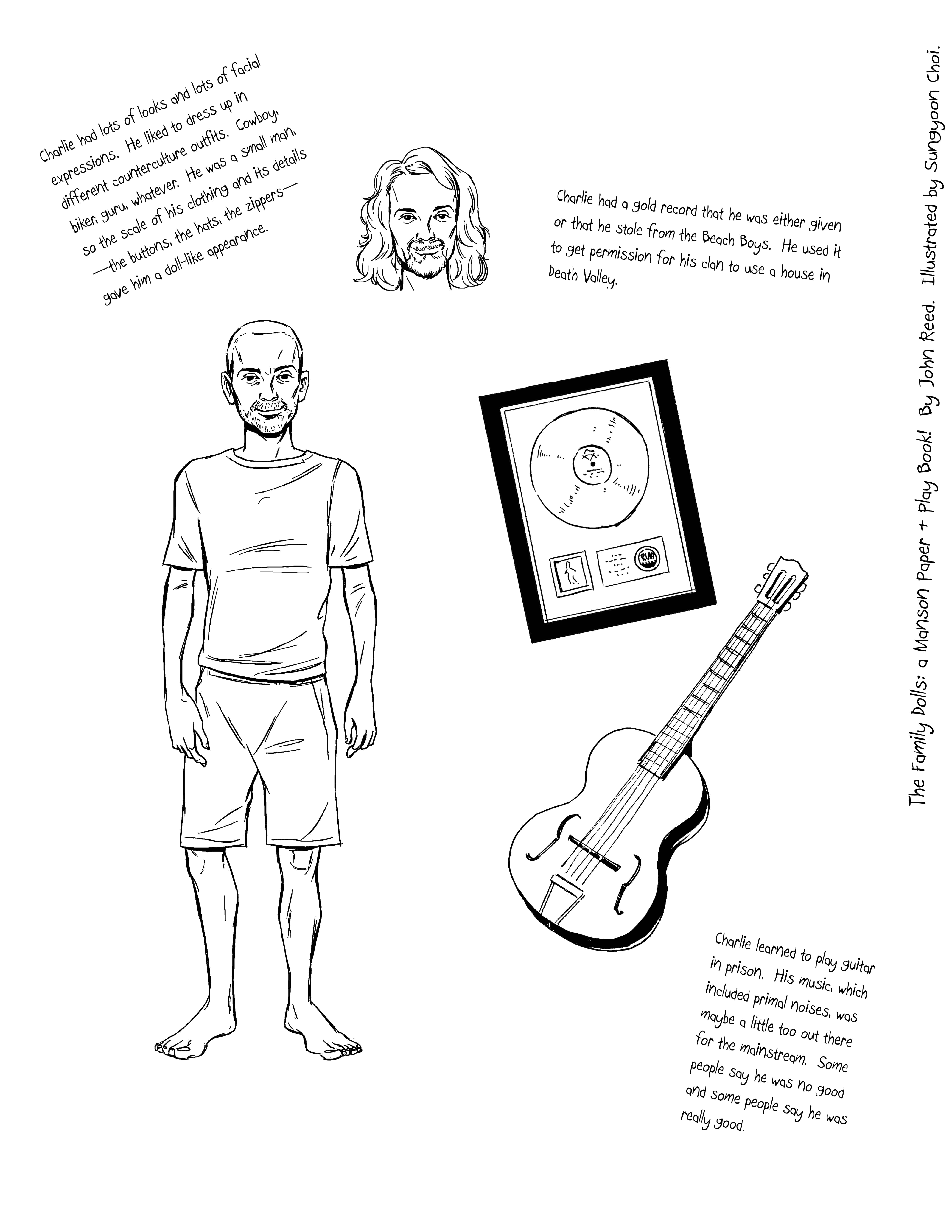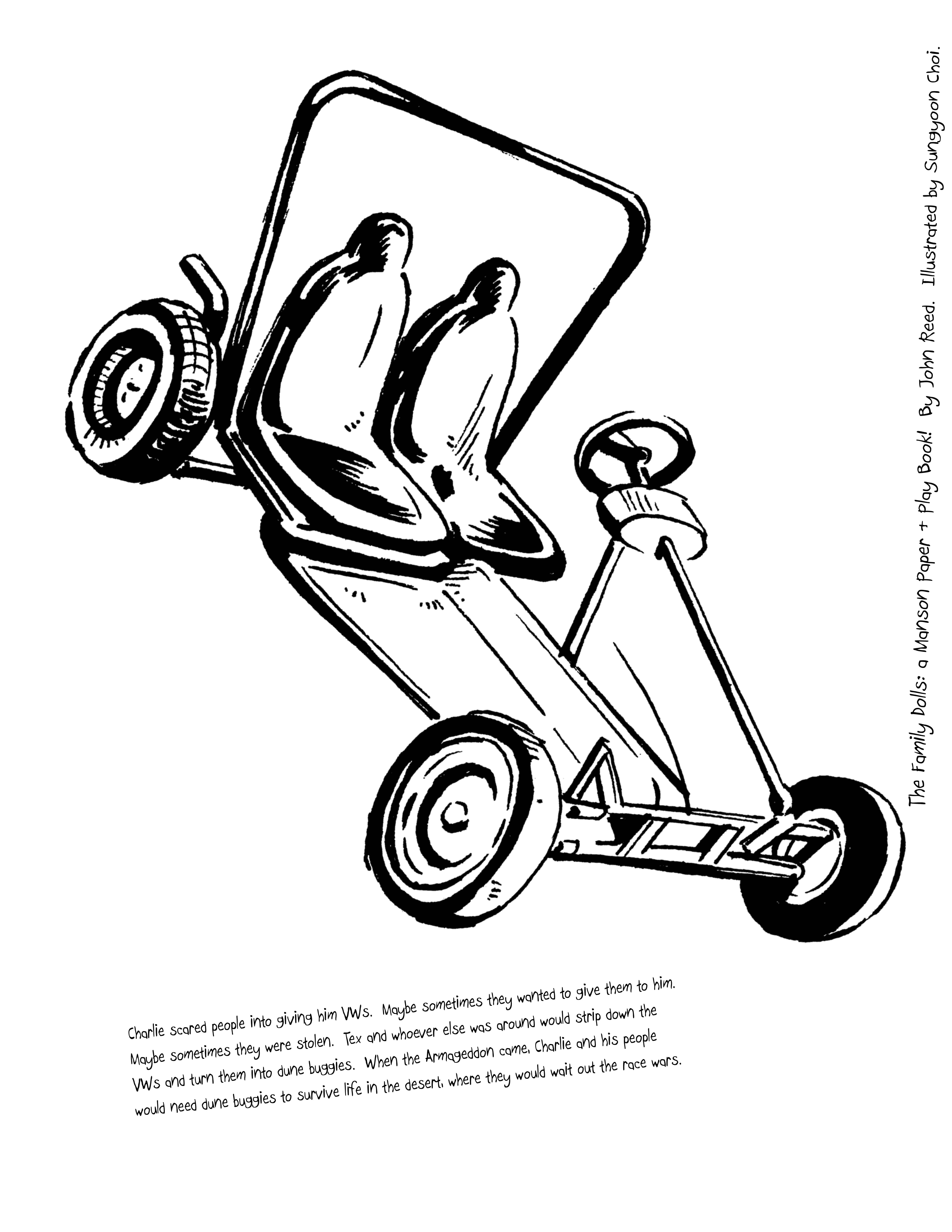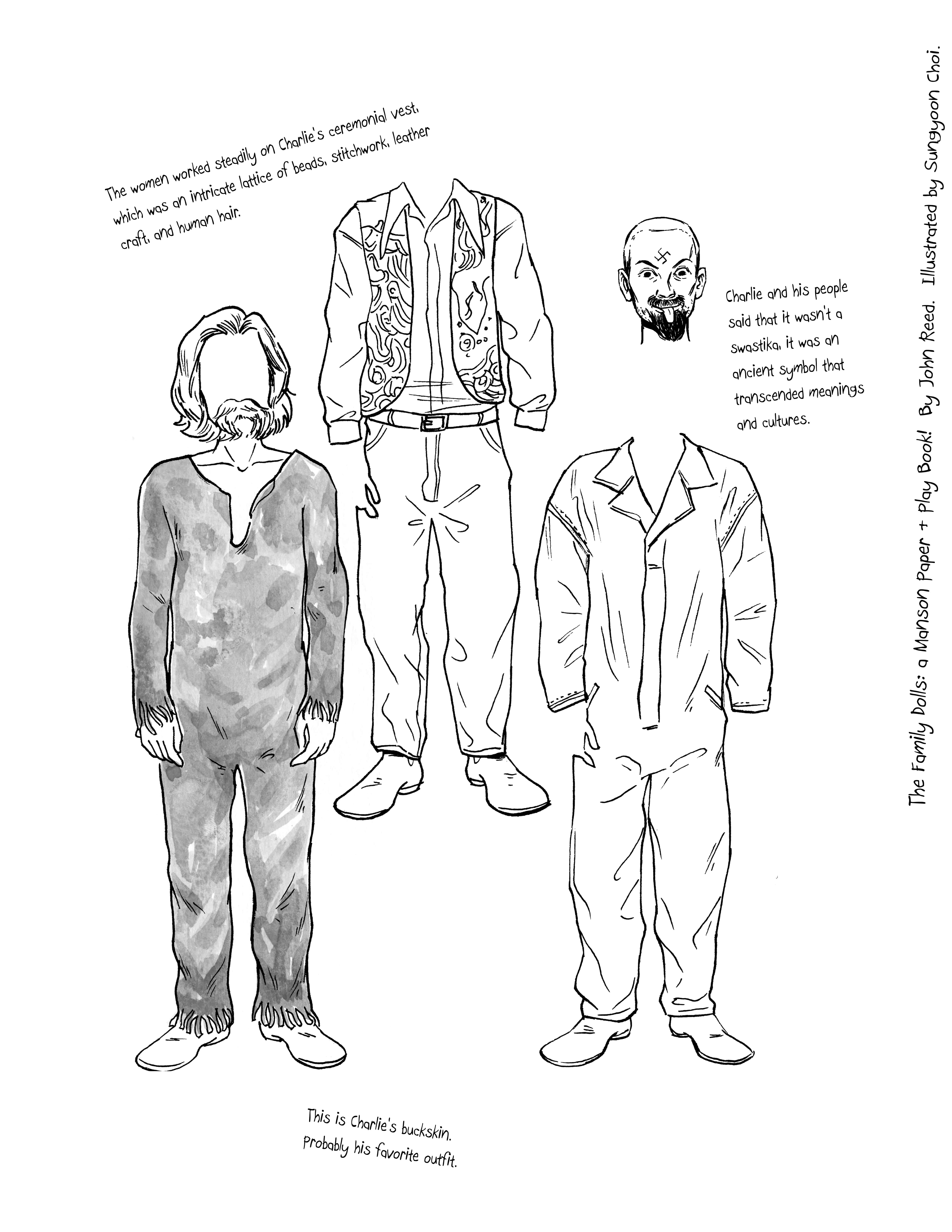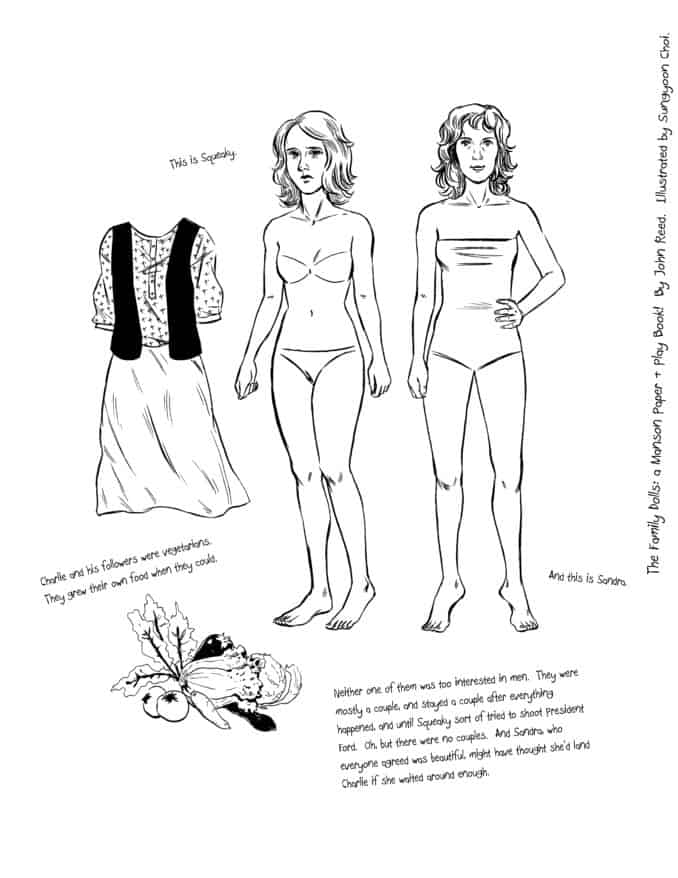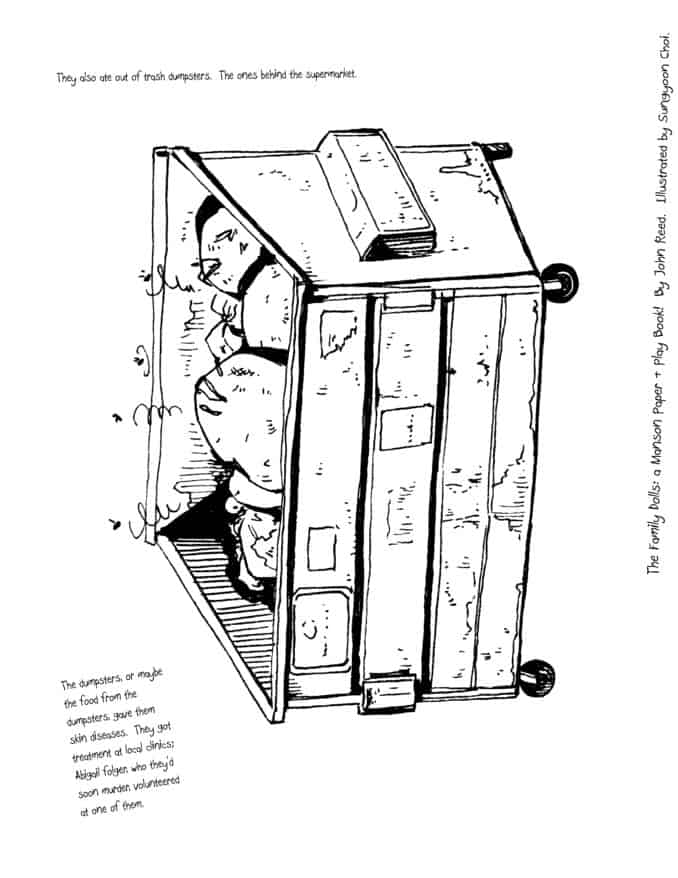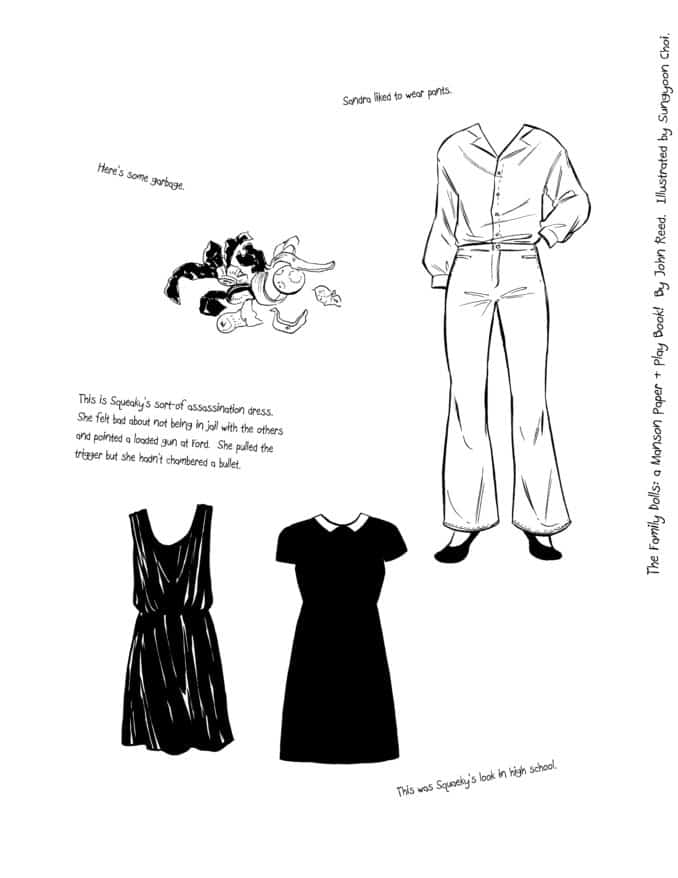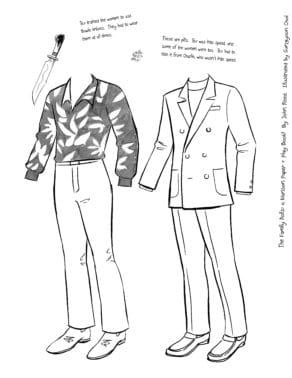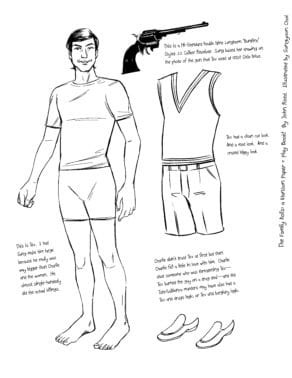The first five installments of the series.
Read the introduction to John Reed’s “The Family Dolls, Featuring Charlie, Leslie & More” here.
Homecoming Princess
Leslie had one of those big tooth smiles that makes you want to find a van and coax her in and drive her to the end of the earth and stay there with her.
She was attracted to smart bad-boy types, maybe because her father had some bad boy (alcoholic, divorced mom and remarried), maybe because living in the suburbs was like breathing in a plastic bag, maybe because being middle class in 1965 meant having to deal with the Vietnam War, how wrong it was, and how she and every other middle-class kid was culpable. She had an older brother who’d already served time in the brig; he wouldn’t fight.
Leslie’s mom said that when she was little she had a good sense of humor and was “feisty.” Besides her older brother, she had two younger siblings, adopted Korean War orphans. The family went to church, went camping and hiking (they lived right near Eaton Canyon Park), and sometimes drove to the beach. Dad was an auctioneer and mom taught at the church school, even though she preferred just being a mom. Leslie put up with high school—Monrovia High, ten miles from where she was born—a smart kid who did just enough schoolwork to keep a low profile. She was more into doing than studying: Camp Fire girls, Future Teachers, church choir, band (tuba), Job’s Daughters, student government, and homecoming queen, twice.
Leslie: “I liked winning, and I always won.”
She was fourteen when her parents divorced; she survived but missed her dad and got a boyfriend, Bobby Mackey, who’d been expelled from high school. Beatlemania was getting old, and drugs were around, LSD and pot, so she got into that—and school got even lamer. She lost interest in books and needlework; got pregnant and had an abortion, which was not an uplifting experience; and moved in with her father after graduation. She started thinking maybe she should be a nun—a Catholic one. Then she and Bobby got involved in the Self-Realization Fellowship, which taught enlightenment through mediation, yoga, and celibacy. The SRF needed a secretary, so she went to secretary school and learned to take 160 words a minute shorthand and type sixty words a minute.
Bobby: “A beautiful human being, great self-image, socially active. She was aggressive. She knew what she wanted, and she got it.”
1968, June
03 Andy Warhol is shot in his studio in NYC. He survives. 04 Four hundred graduating students walk out on Commencement Day ceremonies at Columbia University. Over a thousand police officers are present; many are disguised in graduation robes. Seven million students will protest on US campuses in 1968. 05 The titular track from Johnny Cash’s May LP release, Live at Folsom Prison, is pulled from radio play with the assassination of Senator Robert F. Kennedy, due to the line “I shot a man in Reno / Just to watch him die.” 08 James Earl Ray, the suspected gunman in the assassination of Dr. Martin Luther King Jr., is arrested. 12 Theatrical release of Rosemary’s Baby, directed by Roman Polanski. 14 In relation to draft protests, Dr. Benjamin Spock and four others are convicted on conspiracy charges. 16 Parisian police reclaim the Sorbonne University. In May, a student strike led to a general strike of ten million. 19 On Juneteenth—the celebratory date for the end of slavery in the United States, the Libre Community of artists is founded on 360 acres in Colorado; in Washington, under the direction of Martin Luther King and other organizers, fifty thousand people march on the National Mall. 21 In Booneville, California, Susan “Sadie” Atkins is one of five arrested in a narcotics raid. Ten days later, she’s released, re-arrested, and re-jailed. 24 Authorities dismantle “Resurrection City,” a shantytown constructed as part of the Poor People’s March on Washington. 24 Montreal’s St. Jean Baptiste parade erupts in violence. 29 “Tip-Toe thru’ the Tulips,” by Tiny Tim, peaks at number seventeen on the US charts.
1968, July
01 Publication of the thirty-two-page statement “Toward a Female Liberation Movement,” by Beverly Jones and Judith Brown. The text begins with a “shattered” layout of text snippets. One example: “Turn on the electricity and see her glow. It’s American Woman, 1968. She’s better than a robot: she’s self-programming.” 01 The Boys Town Choir appears as a part of the “National in the Rockies” convention. An album of a Tokyo performance is in the works, and the album Christmas with the Everly Brothers and the Boys Town Choir is scheduled for rerelease. The Boys Town of this period will be plagued by accusations of abuse and pedophilia. Manson describes routine rapes in state care; in 1952 he was charged with having sodomized another boy. 07 The Realist publishes the essay “The Yippies are Going to Chicago,” by Abbie Hoffman. 11 LP release of Waiting for the Sun, by The Doors. 15 For three consecutive nights, club-swinging police march through the Haight Ashbury district of San Francisco. Since the Summer of Love, 1967, the neighborhood has festered. 17 A coup d’état topples the government of Iraq, which will lead to Saddam Hussein’s appointment as vice chairman of Iraq’s Revolutionary Council. 17 In Chicago, Operation Breadbasket boycotts A&P stores. 18 LP release of Anthem of the Sun, by the Grateful Dead. 23 Five-day race riot in Cleveland, Ohio. 24 At the Newport Folk Festival, Arlo Guthrie first records “Alice’s Restaurant,” which he performed for the first time at the festival the previous year. 25 The birth-control pill is condemned by the pope. 27 Three-day race riot begins in Gary, Indiana. 28 In response to police brutality, the American Indian Movement (AIM) is born. 30 Virginia Slims market tests the advertising campaign “You’ve Come a Long Way, Baby.”
Leslie Meets Bobby
Leslie aced secretary school. She registered at an employment agency. The SRF thing had been a fantasy she had with Bobby (and maybe her father), but she and Bobby didn’t last.
Leslie: “When you’re young and very in love, the breakup can be very difficult—so I was trying to make it on my own.”
She moved in with friends in Victorville, California, a nowhere-to-be desert town, where she met Bobby Beausoleil, musician, artist, and knife thrower. He had a small group of women already in train, but Leslie was into him, so the two of them stole one of her friends’ cars and drove off.
Leslie: “He was an angel, and I told him I would love him forever.” Leslie called her mother to say she wouldn’t be in touch for a while—she was going to do what she wanted, when she wanted, where she wanted. She was “dropping out.” Bobby had a house tent on the bus, an old munitions truck. He called himself “Sir Hokus,” (aka “Cupid,” aka “the Frenchman”) and described himself as a minstrel; he wore a confederate war costume and carried a cane and a top hat. They drifted north, stealing food along the way.
The Haight was getting seedy, but San Francisco was Bobby’s scene. He’d been in a few bands—one of them, Love, was a big deal. Bobby said he’d been too young, seventeen, to sign the record contract.
Bobby was also an actor. Bobby had also been in a few movies. For a couple of years he’d worked with Kenneth Anger on a film. Bobby did the music and starred as Satan. But he and Anger had a blowout (they may have been lovers), and Anger had placed a curse on him. In LA, Bobby had done a soft-core porno film, Ramrodder, at an old western set—the Spahn Ranch. That’s where Bobby had met one of his women, Catherine “Gypsy” Share, who’d also had a part in the film. She was a little older, wiser, and more radical than the average hippy. Gypsy wanted a messiah, and there was one man she kept talking about, “The Wizard,” who had his own bevy of women. In late August, Leslie got to meet him.
Leslie: “He just walked up and smiled real nice, you know, and I just smiled back. And he wasn’t any different than all the others. But I could feel much strength in meeting him.”
1968, August
01 LP release of Wheels of Fire, by Cream. 02 In The Berkeley Barb, Ed Sanders publishes his satirical essay “Predictions for Yippie Activities.” Highlights: ass washing, worship of filth, protestors armed with fish eyes. 03 In his musings on The Beatles, he echoes a popular assessment of the day: “The Beatles are a new family group. They are organized around the way they create. They are communal art. They…form a family unit that is horizontal rather than vertical.” 04 At the Newport Folk Festival, Steppenwolf performs “Born to be Wild.” It’s the dawn of heavy metal. 05 In Los Angeles, Black Panthers Tommy Lewis, Steve Bartholomew, and Arthur Morris are shot dead by police. 07 James Brown records “Say it Loud—I’m Black and I’m Proud,” which will become an anthem of Black Power. 08 At the Republican National Convention in Florida, Richard Milhous Nixon wins the party’s presidential nomination. 08 Race riots in Miami, ten miles from the Republican Convention. Three die by police bullets. 09 In Van Nuys, California, Beach Boys associate Gregg Jakobson records several songs with musical prospect Charles Manson. 09 End of a 267-day strike by Detroit newspapers. 12 In New York, Janis Joplin and Big Brother and the Holding Company Band release the studio/live album Cheap Thrills. 12 The Beach Boys perform live in London. 13 Alexandros Panagoulis, Greek politician and poet, mounts an attempted assassination of right-wing military leader Colonel George Papadopoulos. 15 Radio Free London commences transmission of pirate FM radio. 18 The Peace and Freedom party selects Eldridge Cleaver as its presidential candidate. 19 Publication of Tom Wolf’s The Electric Kool-Aid Acid Test, which chronicles the adventures of Ken Kesey and the Merry Pranksters. 19 LP release of Best of The Beach Boys Vol 3 and The Beach Boys compilation Stack-O-Tracks. 20 Soviet tanks, backed by 200,000 troops, invade Prague. 23 In Chicago, the Yippies nominate Pigasus the Immortal, a pig, for President. The pig and six others are arrested. 24 With the detonation of a hydrogen bomb in the South Pacific, France becomes the fifth thermonuclear power. 25 Five days of demonstrations and riots commence at the Democratic Convention: 10,000 demonstrators versus 11,000 Chicago Police, 6,000 National Guardsmen, seven thousand five hundred army troops, and one thousand FBI and military intelligence agents. After the convention, the Chicago police reported 589 arrests, 119 police injuries, and 100 demonstrator injuries. Activists estimate 300 demonstrator injuries. The clash is dubbed “Czechago,” alluding to Russia’s lockdown of Prague. 26 The singles “Hey Jude” and “Revolution” are the first releases of Apple Records, founded by the Beatles. 27 Tom Hayden, arrested during demonstrations at the Democratic Convention, is beaten and held in the Cook County Jail.
“The God of Fuck”
Bobby hit the road and left Leslie at Spahn Ranch with “The Wizard.” Leslie saw something in Charlie Manson, and she saw that Bobby saw something in him. The sex was uninhibited, but she was still surprised when she saw Bobby giving Charlie a blow job. Charlie called himself “The God of Fuck,” and was supposed to be such a great lover that women had to beware of heart attack. Leslie wasn’t too impressed with his prowess, and they only had sex a few times—Charlie wanted to leave her for Bobby. Charlie was a musician, ambitious, and Bobby was connected and gifted and might be useful.
Charlie was older: 34, but he was a youthful person, only 5″3″ and with a young mindset—partly because he’d spent most of his life in state custody and jail. Two years before, he’d gotten parole. He’d actually asked to stay in prison, the only home he knew, but when he ended up in the Haight—the Summer of Love—he fell right in, playing his folksy, prison guitar, and living off petty crime. His rap was a mish-mash of prisonyard, Scientology, Gnosticism, Buddhism, Christianity, astrology, California cult, Satanism—whatever was going around. He played his music in the Tenderloin District, and gathered devotees.
Some of the people at Spahn were familiar to Bobby; Susan “Sadie Mae Glutz” Atkins had lived in San Francisco, and like Bobby, had been involved in Anton LaVey’s Church of Satan. Charles “Tex” Watson, new to Spahn, was a former High School BMOC, star athlete and over-achiever; he’d left Texas, dropped out of college, and given up his mod lifestyle as a wig salesman and dope dealer. Tex was trying to prove himself by building a house on Spahn.
Charlie knew how to keep everyone fed and jobless. And he was almost a rockstar. Traveling California, he and the women, “the Witches of Mendocino,” had hooked up with Dennis Wilson of the Beach Boys. By August, they were all living at Wilson’s house, driving his cars, and hanging out with his friends, some of them famous, and some of them powerful. Charlie knew all the big name people and Angela Lansbury’s kids were around; the daughter, 14, carried a note from her mom saying it was ok. Dennis and Charlie churned out recordings in Dennis’s home studio. Neil Young was impressed by Charlie, and talking to industry people about record deals.
Leslie: “You couldn’t meet a nicer group of people.”
1968, September
09.01 The Manson group purchases a school bus and paints it black. They drive the bus while the paint is wet, and the bus, festooned with flotsam, has a felty appearance. 04 In the Congo, an army coup deposes President Maseba-Debat. 06 Mattel’s Hot Wheels hit toy stores. 07 In Atlantic City, New Jersey, women liberation groups protest the Miss America Pageant. The press release reads: “this year, reality will liberate the contest auction-block in the guise of “genyooine” de-plasticized, breathing women. … It should be a groovy day on the Boardwalk in the sun with our sisters. In case of arrests, however, we plan to reject all male authority and demand to be busted by policewomen only. (In Atlantic City, women cops are not permitted to make arrests—dig that!).” 06 Swaziland gains independence from the United Kingdom. 08 Huey Newton, leader of the Black Panther Party, is convicted of the voluntary manslaughter of an Oakland policeman. 09 Arthur Ashe is the first black person to win the US Open. 11 Responding to a statement made by the Black Unity party, which began, “The Brothers are calling on the Sisters not to take the pill,” the “Black Sisters” write “black sisters decide for themselves whether to have a baby or not to have a baby.” 11 The Beach Boys record a version of Manson’s song “Never Learn Not to Love.” 11 U.C. Berkley offers non-credit lectures by Eldridge Clever. The State, led by Governor Ronald Reagan, refuses to pay Cleaver, and threatens to withhold the University’s annual budget. 16 Richard Nixon belts out “Sock it to Me!” tagline of the television show, “Laugh-In.” 18 Amidst protests, the Mexican Army occupies Mexico City University. 24 Premiere of the television cop show, Mod Squad. 28 “Hey Jude,” goes #1 on the US charts. 30 The 900th US military aircraft is shot down over North Vietnam.
“Spahn Ranch”
Dennis Wilson had his people add it up; he’d spent over $100,000 on freeloaders. He moved out of his playboy crash pad and three weeks later, when the lease expired, Manson and the crew moved back to Spahn—but Manson still had some juice with Wilson. One of Wilson’s partners, Gregg Jakobson, and one of Wilson’s friends, Terry Melcher, who was a major LA producer (The Beach Boys, The Byrds, The Mamas & The Papas) and the son of Doris Day, were interested in Manson. Manson had his people singing and called the troupe “The Family Jam.”
Charlie would say everything was about sex, in and out. While everyone was tripping and making love, he’d stay straight to talk his game and help “his children” get over their hangups. For ex.: men had to have sex with men, and women had to have sex with him while they fantasized about their father.
Lyrics from Charlie’s song, “Always is Always Forever”: “Always is always forever / As long as one is one / Inside yourself for your father / All is none all is none all is one.”
Charlie didn’t like Hippies, he called his people “Slippies,” and kept the men in shortish hair. But Spahn was a typical Aquarian commune: big porch, showers outside. The women took care of the many children (the women weren’t supposed to talk to the children, just babble, because mothering was one of Western Culture’s biggest problems), and prepared meals with ingredients harvested from the trash of the A&P.
“All are one,” but there was a hierarchy; Leslie, as newbie, was at the bottom. Charlie could get freaked out by strong women—he hit women occasionally, because it was “what they wanted,” and one time he almost beat Gypsy to death. Leslie (now “Lulu”) regressed—lived in a dream. Every day was dress up: as cowgirl, she gave tours of Spahn; as motorcycle woman, she fixed the bikes; as a “back to the lander” she pumped water at the water pump. The women shared clothing that they hand washed and kept in a heap; their bond was sisterly.
Tex: “Then there was Leslie Van Houten, in some ways the prettiest of the women. Leslie was like a little girl—emotional, easily hurt, spontaneous, willing to do whatever she felt like doing, without thinking. The other girls ordered her around a lot and she accepted it, falling in her ‘mountain folk’ role, complete with lazy, exaggerated accent and pretended helplessness. Underneath all the crazy playacting and little-girl manner, I felt she was always genuinely afraid of Charlie. There was no question that she would do anything he told her to.”
1968, October
10.01 No More Fun and Games: A Journal of Female Liberation publishes the photo essay “What Sort of Man Reads Playboy.” 01 The horror film Night of the Living Dead premieres in Pittsburgh. 02 In Mexico City, the Mexican Army opens fire on 6,000 protestors at National Polytechnic Institute. Fifteen hundred are jailed, 500 are injured, and 300 are killed. 03 Howard Sackler’s The Great White Hope, starring James Earl Jones, opens on Broadway. The bio-play is based on the life of Heavyweight World Champion, Jack Johnson. 03 Yippie, Jerry Rubin, arrives at House of Un-American Activities inquiry with a toy machine gun; his cape is the colors of the Viet Cong flag. 03 Driving into Death Valley, Charles Manson tells one of his people that the assassination of Martin Luther King was a “heavy number.” 05 Two days of civil rights riots in Derry, Ireland. 07 Susan “Sadie” Atkins gives birth to Zezozose Zadfrack Glutz. 09 The Catonsville Nine, a group of Catholic activists who broke into the Maryland draft board and destroyed 378 draft files with homemade napalm, are convicted and sentenced to a total of 18 years in jail; attacks on draft boards become commonplace. 09 In the Congo, Pierre Mulele, rebel leader, is subjected to public torture and execution. 10 Theatrical premiere of Barbarella, starring Jane Fonda 12 In Mexico City, the torch is lit for the XIX Olympiad. Thirty-two African nations, as well as Iraq, Syria, Pakistan, Malaysia, Saudi Arabia, Cuba, and Somalia, formed a coalition to boycott the games if South Africa were to attend. India and the Soviet Union threatened to join the coalition as well, and the International Olympic Committee revoked the invitation to South Africa. 13 In Frankfurt, Andreas Baader, Gudrun Endsslin, Horst Sohnelein, and Thorwald Proll are convicted of arson, and sentenced to three years in prison. 13 The corpses of Nancy Warren, the pregnant wife of a police officer, and Clida Dulaney, Warren’s grandmother, are discovered near Ukiah, California. They have been beaten and strangled in ritualistic manner. Leather laces, similar to the ones used by Charles Manson in the Labianca murders at Waverly Drive, are employed in the crime. The Family is in the area. The murders go unsolved, but the Warren family files a civil suit naming two John Does and two Jane Does. 15 The Kirkus Review gives a marginally positive nod to the novel Mash by Richard Hooker and W.C. Heinz. 16 Theatrical release of The Boston Strangler, starring Tony Curtis and Henry Fonda. 18 At the Olympics, U.S. athletes Tommie Smith and John Carlos give a black power salute during their medal ceremony, holding the pose through the playing of the U.S. national anthem. The U.S. Olympic committee suspends the two athletes. 18 John Lennon and Yoko Ono are arrested for possession of drugs. 20 Jacqueline Kennedy marries Aristotle Onassis, a Greek shipping magnate. 23 At U.C. Berkeley, 400 demonstrators protest the denial of academic credits for the Eldridge Cleaver course. 23 Theatrical release of Pretty Poison, directed by Noel Black. Anthony Perkins and Tuesday Weld star as an ex-convict and high school cheerleader who commit a series of crimes. 25 LP release of Electric Ladyland by Jimi Hendrix. The album includes “Voodoo Chile,” and “House Burning Down.” 25 LP release of This Was, by Jethro Tull. 27 In editorial, William Grier and Price Cobbs, co-authors of Black Rage, respond to a negative New York Times review, noting, “after 62 highly favorable reviews, the 63rd and first critical comment came from a black brother.” 27 Police clash with 6000 anti-war protestors outside the U.S. embassy in London. 28 In Washington, Abbie Hoffman attempts to enter a building where a subcommittee of the House Un-American Activities Committee has convened. He’s arrested for wearing a shirt that resembles an American flag. 30 Ramon Novarro, latin Hollywood star of Ben Hur, is killed by two male hustlers. 31 Ouster of Liu Shaoqi, president of China. 31 In their school bus, the Manson “Family” sets out for Death Valley. Family members report that Charlie miraculously elevates the bus over inhospitable terrain. They secure residence at the Barker Ranch, which is owned by “Ma Barker,” the grandmother of a Family member.
1968, November
11.01 The Moderator publishes “The Women’s Liberation Front,” an essay by Jo Freeman, who begins, “Before reading this article, turn to the first page of this magazine and read the masthead. There you’ll find that subscriptions to The Moderator are “Free to all qualified male students. $3 per year to all others.” Overt discrimination against women? Probably, but more realistically, The Moderator is just a little less hypocritical than its contemporaries. Even if they decided to remove the word ‘male’ very few women would receive this magazine free. Because women aren’t qualified.” 05 By a margin of less than a million (out of 60 million voters), Richard M. Nixon is elected President of the United States. 06 At San Francisco State University, the Black Students Union and The Third World Liberation demand academic representation of minorities on campus. The coalition commences a 167-day strike. 06 Theatrical premiere of Head, the Monkey’s movie. 13 U.S. theatrical release of “Yellow Submarine,” an animated feature starring the Beatles. 14 Draft card burnings on “National Turn in Your Draft Card Day.” 15 In the Berkeley Barb, Gary Snyder publishes “Buddhism and the Coming Revolution,” which argues that a philosophy of “oneness” is incomplete to the task of social change. 15 Near Death Valley, Carl Stubbs, a spiritualist retiree, is found beaten in his home. He dies shortly after. He had been in the company of two unidentified young “hippy” women. Patricia Krenwinkle is questioned a year later. 24 Eldridge Cleaver and his wife flee the United States. 24 Pena Soltren and two accomplices hijack a B-707 to Cuba. 25 U.S. LP release of The White Album, by the Beatles. 27 In Chicago, a program for “Radical Feminist Consciousness-Raising” is presented at the First National Women’s Liberation Conference. 28 John Lennon and Yoko Ono plead guilty to possession. Yoko had miscarried a week before.
12.01 First publication of Lilith, a women’s liberation magazine out of Seatle, Washington. 01 Charles “Tex” Watson and Charles Manson leave the Barker Ranch. In L.A.—a few doors away from the Spiral Staircase, where Manson had spent time in 1968 and 1967 when Bobby Beausoleil lived there—the two first hear the Beatles’ White Album. 02 Charles “Tex” Watson flunks the Army physical. He remains in L.A., and attempts to resurrect his wig trade. 02 Nixon names Henry Kissinger National Security Advisor. 02 Student uprising in New York City high schools. 03 The Elvis comeback special airs on NBC. 04 The U.S. stock market tips into an 18-month plummet. 05 Eduardo Castera hijacks a B-727 to Cuba. 07 LP release of Beggars Bouquet by the Rolling Stones. The album includes the track “Sympathy for the Devil.” 11 Founding of the splinter group, the Popular Front for the Liberation of Palestine General Command. 11 A young black couple hijacks a DC-8 to Cuba, treating passengers to tours and meals upon arrival. 13 Protests close College of San Mateo for four days. 18 In Santa Monica, California, at a parking meter near the tennis courts of Lincoln Park, Caroline Olsen is shot dead during a robbery attempt. Black Panther leader Geronimo Pratt, wrongfully convicted, will serve 27 years in prison for the crime. 18 Formation of Akwesasne Notes by the Mohawk Nation. The newspaper is an outgrowth of Mohawk resistance to the U.S. government. 20 In Vallejo, California, David Farraday and Betty Lou Jensen are shot in a parked car. The murders are the first attributed to the Zodiac killer, who boasts to police that he’s killed 37. 26 Palestinian terrorist attack on Israeli airlines. One dies. Though convicted, Mahmoud Mohammed escapes to Canada. 26 Formation of the Communist Party of the Philippines, which will organize the New People’s Army, commencing a Guerrilla war. 26 Timothy Leary is arrested on drug charges. 28 The Beatles’ White Album, goes #1 in the United States. 30 Marina Habe, who is friendly with members of the Family, is abducted from her West Hollywood home. Her corpse, death by stabbing, is discovered New Year’s day. The crime goes unsolved; the investigation focuses on the Family. 31 Charles Manson returns to Death Valley. It’s a cold night, and he gathers his group around a campfire to expound upon the significance of the White Album, and foretell the coming of “Helter Skelter.”
“Tex” and Armageddon
By November, Charlie had lost momentum on his album deal, and there were 550,000 U.S. troops in Vietnam. Racial tensions were high—there were protests and violent clashes every day. Charlie drew on what he knew from prison to divine the future; “the Black Man,” in the form of Islam, would wipe out “the White Man,” who was superior but had it in his karma to be decimated.
Charlie relocated his people—took them to a ranch in Death Valley, which he secured in trade for a Beach Boys Gold Record that he’d swiped or taken as a gift (or something in between). He told Ma Barker, the owner of the ranch, that he and his group were musicians.
There was belladonna growing in the dessert, and the Family cooked it up. Tex took a massive dose and got arrested and beaten up in jail; he was never quite the same. He tried to go back to L.A. and his old girlfriend and life in the wig biz.
Leslie took on more responsibilities—managing the ranch, and sitting with Charlie to read him the bible. Charlie had a mystical relationship with nature—he walked through a den of snakes, and had a pet crow named “Devil.” To Leslie, the desert was “complete peace. The only thing you could hear would be the hum of the air.”
Sadie: “There was Leslie. At eighteen or nineteen, she had considerable mental and emotional strength. She was smart, more than able at that early stage to hold her own with anyone, except perhaps Charlie.”
The day’s work: killing the ego by walking around saying, for ex., “die, Leslie, die”; hiding gas and food for the coming Armageddon; making roads in the desert (Charlie had totaled the bus and would need an armada of dune buggies); knife training (how to kill); playing music and harmonizing; becoming Charlie (standing in front of him while mirroring his expressions and gestures).
Manson’s people went down to LA once in a while, and mid-December, not long after Yellow Submarine came out, a few of them saw it. Charlie was already listening to the Beatles’ White Album, which he believed was directed at him and the Family. The Beatles were singing about “Sexy Sadie” and the coming race war, which they called “Helter Skelter,” after a U.K. carnival slide. In a hidden message, the Beatles said, “Charlie, send us a telegram.” In January, to help everyone attain a “submerged consciousness,” Charlie moved the Family to its own “Yellow Submarine,” a house in Canoga Park, about half an hour from downtown L.A., and not nearly as cold as Death Valley in winter.
1969, January
01.01.69 Just north of Berkeley, Odds ‘n Ends, the first waterbed store, opens for business. Charles Hall introduced the invention, dubbed “The Pleasure Pit,” at “Happy Happenings,” a 1968 summer art exhibition at the San Francisco Cannery gallery. 01 People’s Democracy, an organization founded three months before in support of civil rights for Northern Ireland’s Catholic minority, begins a four-day march from Belfast to Derry. 02 The Beatles, breaking up, record Abby Road. 02 Newark police confiscate 29,850 album covers. The portrait gracing “Two Virgins” features the full frontal nudity of John Lennon and Yoko Ono. 06 At San Francisco State, 350 teachers go on strike; they want education reform and an end to police occupation of the campus. 07 Governor Ronald Reagan demands the California legislature “drive criminal anarchists and latter-day fascists off the campuses.” 10 Charles Manson, in L.A., sends for the Family. He’s found a house in Canoga Park. 12 LP release of Led Zeppelin, the first Led Zeppelin album. 16 In protest to the soviet invasion, Jan Palach, a 21-year-old university student, sets himself on fire in Prague. He dies five days later. 17 Black Panther leaders John Huggins and Alprentice “Bunchy” Carter are shot to death in a UCLA lunchroom. The shooters are members of a rival Black Nationalist group. 18 The Yippies hold a Counter Inauguration. They swear in Pigasus the pig, then “assassinate” him. Poetry and music follows. 24 As part of the counter-inaugural protest activities in Washington, Shulamith Firestone (editor of 1968’s Notes From the First Year, a theory and practice journal of the Women’s Liberation Movement) and others distribute flyers that declare, “The women’s revolution will be the ultimate revolution. And we have sounded the opening gun.” 20 Richard M. Nixon is sworn in as the 37th U.S. president. 20 The salary of the U.S. president doubles to $100,000. 22 Minority students at the University of California at Berkeley form the Third World Liberation Front, and initiate a three-month strike. Governor Reagan sends police. Concurrently, students at San Francisco State University are striking. That strike lasts five months. 23 Theatrical release of The Ramrodder, featuring Bobby “Cupid” Beausoleil and Catherine “Gypsy” Share. 24 Following the first planned assassination carried out by the ETA, a Basque separatist organization, nationwide unrest and riots, and the arrest of 300 students in Madrid, the Spanish government declares a state-of-emergency, and martial law. The ETA will murder over 800 people, and kidnap dozens, in coming years. 26 After two days of floods and mud slides, FEMA declares southern California federal disaster area. Ninety-one die. 26 Elvis Presley returns to the studio, recording Long Black Limousine, which includes “Suspicious Minds” and “In the Ghetto.” 27 In Baghdad, fourteen men, nine of them Jewish, are executed as Israeli spies; 500,000 citizens celebrate under the hanging bodies. 27 Convicts Byron Vaughn Booth and Clinton Robert Smith escape from the California Institution for Men at Chino. The next day they hijack a DC-8 to Cuba. 28 Blowout on the Union Oil platform off Santa Barbara, California; 2000,000 gallons of crude oil contaminate 35 miles of coastland and 800 square miles of ocean. 30 On the roof of Apple Records, London, the Beatles give their final performance. 30 At Howard University, medical students boycott classes, demanding the ouster of the department chair. 30 LP release of The Holy Land by Johnny Cash.
1969, February
02.01 No More Fun and Games: A Journal of Female Liberation publishes “An Argument For Black Women’s Liberation As a Revolutionary Force,” an essay by Mary Ann Weathers, who writes, “Women’s Liberation should be considered as a strategy for an eventual tie-up with the entire revolutionary movement consisting of women, men, and children. We are now speaking of real revolution (armed). If you can not accept this fact purely and without problems examine your reactions closely. We are playing to win and so are they.” 02 In Marin County, California, a predawn fire destroys a 24-room mansion occupied by members of “the Chosen Family” commune. 04 In Cairo, Yasser Arafat is elected chairman of the Palestine Liberation Organization (PLO). 05 On the U.C. Berkley Campus, a war has broken out between police and students. 08 The last issue of The Saturday Evening Post hits newsstands. 08 In Mexico, a meteor shower brings day to the night sky; one meteor weighs over a ton. 10 LP release of 20/20 by The Beach Boys. 11 During a protest at St. George Williams College, Montreal, 200 students axe and burn the computer center. 12 Sharon Tate and Roman Polanski sign the lease for 10050 Cielo Drive. They move in three days later. 12 Students at the Howard University School of Law boycott classes and occupy buildings. 13 In Montreal, the Fronde Liberation du Quebec bomb the Stock Exchange. 13 At Duke University, black students take over buildings and demand an African American Studies program. 13 At the University of Massachusetts, 33 protestors are arrested during the occupation of an administrative building. 14 Pope Paul VI deletes St. Valentine and many other names from the Roman calendar of saints. 14 Release of the portable (plastic) Olivetti typewriter. 15 LP release of Instant Replay by the Monkeys. 16 At New York’s Metropolitan Museum of Art, ten paintings, including a Rembrandt, are vandalized. The act is in protest of the museum’s “Harlem on My Mind” exhibit. 17 Bob Dylan and Johnny Cash record songs in Nashville. 18 The PLO attacks an Israeli El-Al plane in Zurich, Switzerland. 22 At Rice University, 1,000 students and 200 faculty members protest the appointment of the new university president. Unrest persists for five days. 24 Students occupy the administration building at Pennsylvania State University. 25 In Vietnam, Navy Lt. Bob Kerrey takes part in a SEAL action that takes the lives of twenty women, children and old men. Kerry will receive a Bronze star for his actions. 27 At U.C. Berkeley, police club and arrest Latino protestors and protest leaders. Governor Reagan sends the National Guard. 27 President Nixon is greeted in Rome by thousands of protestors. Kommune I members, Dieter Kunzelmann and Rainer Langhans, attempt to bomb Nixon’s motorcade. 28 The presiding judge denies Sirhan Sirhan’s request to be executed.
1969, March
03.01 Three days after performing at the Diner Key Auditorium in Miami, Jim Morrison is arrested for felony lewd and lascivious behavior, and misdemeanor public profanity, exposure, and drunkenness. 02 Soviet and Chinese forces clash at the border of Ussuri River. 10 In Memphis, Tennessee, James Earl Ray pleads guilty to the assassination of Martin Luther King Jr. He will recant. 10 Publication of the novel, The Godfather, by Mario Puzo. 10 Theatrical release of Oh! What a Lovely War, directed by Richard Attenborough, starring Laurence Olivier. 10 Theatrical release of The Assassination Bureau, starring Oliver Reed and Telly Savalas. 12 Paul McCartney marries Linda Eastman. 13 Police raid the home of George Harrison, who is arrested with his wife for possession of 120 joints. 15 The skirmish at the Ussuri River Border escalates. Moscow dubs China a world threat; war-fever grips both nations. 18 Commencement of Operation Breakfast, the secret, illegal, bombing of Cambodia; 3,650 B-52s quadruple the tonnage dropped on Japan during World War II. 20 The Chicago Eight are indicted for rioting and bomb making. Black Panther, Bobby Seale, calls the judge a fascist dog, a honky, a pig and a racist. He’s tried separately and sentenced to four years for contempt of court. The remaining defendants, Rennie Davis, David Dellinger, John Froines, Tom Hayden, Abbie Hoffman, Jerry Rubin, and Lee Weiner, mock the court, wearing judicial robes (over police uniforms), blowing kisses and cracking jokes. 21 In El Monte, California, a .22 caliber Longhorn revolver, serial number 1902708, is stolen from the Archery Headquarters. The gun, a former movie prop from Ronald Reagan westerns, will change hands several times, and eventually end up with the Family. It’s the gun used to shoot Lotsa Poppa Crow, and in the murders at Cielo Drive. 21 Alex Rackley, suspected as an FBI informant, is taken to Black Panther headquarters in New Haven, Connecticut, where he’s tortured, and shot. 23 On his rounds in Los Angeles, Charles Manson stops in at 10050 Cielo Drive. He may be looking for Terry Melcher, who’s been traveling, or he may be looking for someone else, or seeing who’s there, or casing the house. Manson spots Sharon in the yard—he’s halted by Sharon’s photographer. Manson is directed to the guesthouse to look for / wait for his party. There, Manson meets Rudi Altobelli, the owner of the home, and an entertainment professional Manson knows through Dennis Wilson. Manson attempts to talk up Altobelli, who tells Manson to leave through the back alley, so as not to disturb the residents. 24 In Manhattan, Lennox Raphael’s play, Che!, which depicts Che Gueverra as a victim of sexual envy, is shut down for obscurity. 26 John Lennon and Yoko Ono are married and proceed to Amsterdam for a honeymoon “Bed-In” for peace.
Illustrated by Sungyoon Choi





